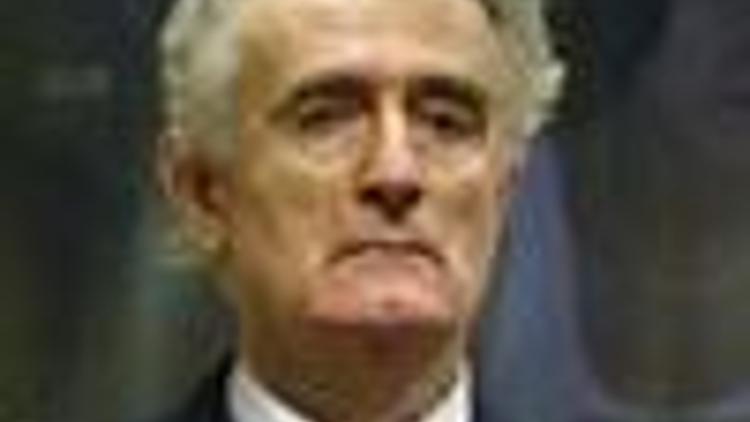Karadzic says he cannot get fair trial; blames U.S.
Güncelleme Tarihi:

Former Bosnian Serb leader Radovan Karadzic says he is the victim of a media witch hunt that will prevent him from getting a fair trial. (UPDATED)
Karadzic made his first appearance on Thursday before the U.N. Yugoslav war crimes tribunal 13 years after he was indicted on charges of genocide, war crimes and crimes against humanity. He has declined to enter a plea to the 11 charges against him.
Karadzic says in claims made public Friday that a witch hunt atmosphere surrounds his trial and that it is fueled by the
He says
Karadzic filed these claims with the tribunal after his appearance Thursday.
SKIRMISHES WITH TRIBUNAL
Karadzic had his first skirmishes with the U.N. war crimes tribunal Thursday: He was cut short by the judge when he tried to protest his arrest, and put on notice that the prosecution will object to his demand to represent himself.
At his initial court session, Karadzic also claimed his seizure and trial violated a deal he made with the United States in 1996 that the case against him would be scrapped if he left politics and did not undermine the peace agreement that ended the Bosnian war.�
Karadzic appeared at a plea hearing one day after he was extradited from Serbia to the custody of U.N. authorities to answer genocide and war crimes charges for the murder of thousands of Bosnian Muslims and Croats and for directing a reign of terror during the ethnic cleansing of the 1992-95 Bosnian war.
He declined to enter a plea to the 11 charges against him, and told the judge he intended to act as his own attorney for the duration of the case.
But prosecutor Alan Tieger asked the judge to caution Karadzic about the risks of conducting his own defense - an indication that the prosecution wanted to avoid a repeat of the much-criticized trial of former Yugoslav President Slobodan Milosevic, who died in jail in 2006 before his four-year trial ended.
"With all due respect to you personally, I will defend myself before this institution as I would defend myself before any natural catastrophe," Karadzic told Judge Alphons Orie.
Orie scheduled a new hearing on Aug. 29 at which Karadzic must enter pleas. If he does not, the court will enter not guilty pleas on his behalf.
It was the first time Karadzic was seen in public since he dropped out of sight more than a decade ago. He appeared thinner, grayer, but still defiant, self-confident and able to joke.
The full beard, long hair and loose white clothes that he wore when posing as a new age psychologist in Belgrade were replaced by a clean shave, fresh haircut and a business suit with a black briefcase.
"Ive been in worse places," he replied with a smile when Orie asked him about conditions at the U.N. jail.
Asked to state his last address before his arrest, Karadzic said officially he lived with his wife in Pale, Bosnia, but also gave a Belgrade address where he lived "in my other identity."
When Orie asked him if his family knows his whereabouts, Karadzic smiled and replied "I do not believe there is anyone who does not know that I am in the detention unit."
Though dismissive of the court, Karadzic was respectful, stood at military attention when Orie entered the courtroom and sat motionless as the judge summed up the charges against him.
But his face showed frustration when Orie refused to let him read a prepared four-page statement outlining "numerous irregularities," including a claim that he was kidnapped three days before his announced arrest in Belgrade on July 21.
Orie cut him off when he began speaking about a deal he made with U.N. negotiator Richard Holbrooke in 1996, a year after he was indicted by the U.N. court in The Hague.
Orie said the court would hear those complaints at the right time, but "the appropriate moment is not now." He suggested Karadzic file a legal submission in writing.
"This is my filing," Karadzic said, holding out the sheaf of papers at arms length.
In a July 26 interview with Germanys Spiegel Online International, Holbrooke was asked about the alleged deal with Karadzic.
"Those are lies I do not comment on any longer," Holbrooke said.
Hamayun Akbari, a British lawyer who was one of about 200 people watching the session from behind the glass of the public gallery, said Karadzic may have raised the issues of "irregularities" to support allegations later that he was not getting a fair trial.
"His behavior was correct. At the same time, he wants to sabotage the proceedings," said Akbari, part of a group from the Hague Academy of International Law which received coveted seats.
In the Bosnian capital, coffee bars showed Karadzic’s hearing on giant flat-screen TVs.
"I’ts him," said Elvir Kljakic, 27, who lost his father and brother during the war. "It’s the beast. I did not believe it until now."
"I’m happy and sad at the same time," said Alena Tiro, 42. "Happy because the world seems to be not as bad as I thought so far if it forced him to the courtroom. Sad because 100,000 people he killed are not watching this."
In the small office of the Association of the Mothers of Srebrenica, about 20 widows watched the broadcast.
"There is the trash," one of them said when Karadzic appeared. Three women burst into tears.
"I have not found one bone of my children yet and there he is - alive," said Ramiza Music, 52, who lost two teenage sons, a husband and two brothers in the Srebrenica massacre. "Today I feel there is a bit of justice in this otherwise really pitiful world."

